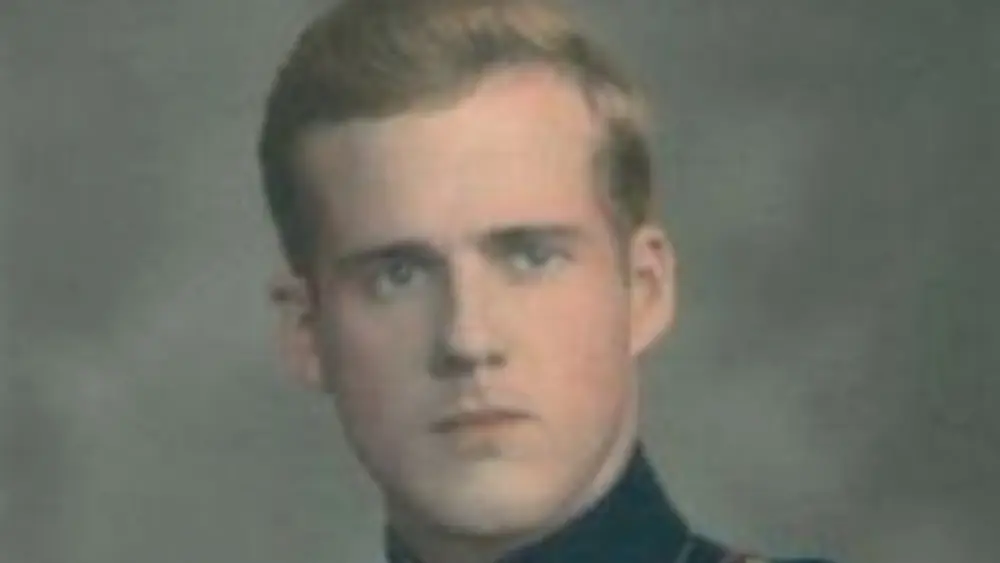Eugene B. Sledge, born on November 4, 1923, in Mobile, Alabama, was a young man who would grow to become one of the most respected voices in the literature of World War II. As a United States Marine serving in the Pacific Theater, he endured the horrors of some of the bloodiest battles in the war’s history. His gritty and unfiltered memoir, With the Old Breed: At Peleliu and Okinawa, remains a seminal work—one that strips away the romanticism of war to expose its psychological and emotional toll.
Sledge didn’t just live through bullets and bombs on the battlefield; he also built a story of recovery, education, and legacy. Through resilience, academic achievement, and authorship, Eugene Sledge carved a life full of meaning and truth, giving voice to thousands of men whose stories might otherwise have faded into silence.
Early Life and Education: Discipline and Patriotism
Eugene Sledge’s early life was framed by a strong family influence rooted in patriotism and service. His father was a physician and a veteran of World War I, and his upbringing in the American South during a time of global unrest helped shape a strong sense of duty in young Eugene.
He began his education at the Marion Military Institute, where the strict environment instilled in him a sense of discipline and responsibility. His experiences there laid a solid foundation for the mental toughness that would later prove essential in combat. His time at Marion also demonstrated his leadership potential, even before he donned a military uniform.
Sledge’s academic path took a significant turn when he joined the V-12 Navy College Training Program, a wartime initiative designed to train future naval officers. This decision underscored his commitment to national service during a time of unprecedented global conflict. However, rather than continuing on a direct path toward a commission through the Navy, Sledge made a life-altering decision: he chose to serve in the Marine Corps.
Despite the V-12 program offering him a relatively safer and more secure route, Sledge felt compelled to be closer to the action. His decision to switch to the Marine Corps reflected a deeply held belief in contributing directly to the war effort, even if it meant exposing himself to far greater danger. He soon entered officer training at Quantico, Virginia, where he began the difficult physical and mental preparation required for one of the most grueling theaters of war.
From Civilian to Marine: Deployment to the Pacific
In 1944, Sledge was deployed to the Pacific Theater, one of the most unforgiving combat zones of World War II. He joined K Company, 3rd Battalion, 5th Marines, 1st Marine Division, marking the beginning of a combat journey that would forever change his life.
Eugene Sledge first saw combat on Peleliu, an island in the Palau group, a strategic point in the push toward the Philippines and eventually Japan. Peleliu turned out to be one of the costliest and most controversial battles of the Pacific campaign. Sledge, barely in his twenties, was thrown into a crucible of unimaginable suffering, bloodshed, and fear.
Battle of Peleliu: War Without Glory
The Battle of Peleliu, fought from September to November 1944, quickly descended into a nightmare for American forces. The Japanese defenders had dug deeply into the island’s coral ridges, transforming Peleliu into a heavily fortified death trap. What seemed like a quick and decisive victory turned into a protracted and hellish ordeal.
Sledge’s account of the battle in With the Old Breed is both vivid and devastating. He describes the unbearable heat, the swarms of flies feeding on the dead, the ever-present danger of artillery and snipers, and the emotional trauma of seeing friends and fellow Marines killed in action. Hand-to-hand combat brutally tore through soldiers, bodies disintegrated before their eyes, and innocence slipped away—all chronicled with an honesty that few war memoirs dare to match.
He also speaks candidly about the psychological toll—the emotional desensitization, the nightmares, and the numbness that took root as the weeks dragged on. Many Marines battled combat fatigue, and while Sledge fought on, what he witnessed forever changed him.
The Battle of Okinawa: Final Push, Lasting Trauma
Following the ordeal of Peleliu, Sledge and his unit were sent to participate in another massive operation—the Battle of Okinawa. This campaign, which began in April 1945, would be the largest amphibious assault in the Pacific and one of the bloodiest battles in the entire war. Okinawa was Japan’s last defensive outpost before the mainland, and the fighting was fierce, desperate, and devastating.
Japanese resistance was unrelenting, and the terrain was treacherous. Rain, mud, and decaying corpses turned the island into a grotesque and miserable landscape. Sledge, who had already seen the worst of war, endured even greater levels of violence and deprivation on Okinawa.
During this time, Sledge began recording his thoughts in a small Bible he carried in his pocket, writing between combat operations to process the trauma surrounding him. These diary entries, written with raw emotion and unwavering clarity, would become the foundation of With the Old Breed. His decision to document his experience was not merely for personal healing—it was a moral mission to tell the unvarnished truth.
Coming Home: A Scholar’s Path to Peace
Following his harrowing experiences in the Pacific Theater during World War II, Eugene B. Sledge returned home to his native Alabama. There, he embarked on a journey of healing and renewal, transitioning from the battlefield to the realm of academia. Sledge’s resilience and determination led him to complete his education, culminating in the attainment of a doctorate in biology. This academic achievement marked a significant chapter in his post-war life, allowing him to channel his formidable intellect and discipline into scholarly pursuits.
Sledge’s post-war path led him to the University of Montevallo, where he assumed the role of a respected professor. In his transition from combat to the classroom, Sledge demonstrated not only his intellectual prowess but also his capacity for resilience and transformation. His contributions to education and science, in addition to his candid memoir “With the Old Breed,” stand as a testament to the multifaceted nature of his life’s journey and his ability to find purpose and fulfillment beyond the battlefield.
“With the Old Breed”: A Memoir That Changed Military Literature
In 1981, decades after the end of World War II, Eugene Sledge published With the Old Breed. The memoir was an instant classic. Critics praised its honest portrayal of war’s brutality, its emotional sincerity, and its literary clarity. It filled a glaring gap in the historical narrative by giving voice to the ordinary Marine rifleman, the front-line soldier who bore the brunt of battle.
Unlike many war memoirs that glorify combat or focus on grand strategy, Sledge’s work is deeply personal. He doesn’t shy away from describing fear, exhaustion, disgust, and heartbreak. The book captured the gruesome reality of war as lived by those in the trenches—bleak, terrifying, and profoundly human.
Historians, educators, and military institutions quickly adopted the book as required reading. It offered a counterpoint to sanitized war films and history books, forcing readers to confront war’s true cost. The critically acclaimed HBO miniseries “The Pacific,” adapted in 2010, brought Sledge’s story vividly to life for a new generation.

Legacy: More Than a Marine
Eugene B. Sledge passed away in March 2001, but his legacy lives on through his writing, his students, and the impact he made on American culture. He is remembered not just as a Marine, but as a truth-teller—someone who bore witness to the horrors of war so that future generations might learn from them.
His legacy is inseparable from his literary contribution. With the Old Breed remains one of the most important personal accounts of World War II and is often cited alongside classics like Ernie Pyle’s writings or The Things They Carried by Tim O’Brien. Sledge showed that war isn’t about glory; it’s about survival, sacrifice, and enduring trauma.
But perhaps more important than his military or literary achievements was his life as a teacher. He exemplified how a man shaped by war could find peace through knowledge and community. His students remember him as a man of quiet strength, gentle humor, and unwavering integrity.
Conclusion: The Lasting Voice of Eugene B. Sledge
Eugene B. Sledge’s story is more than a chronicle of battles won and hardships endured—it’s a lesson in courage, humility, and resilience. From the beaches of Peleliu to the hills of Okinawa, from quiet classrooms to the pages of one of the most powerful war memoirs ever written, Sledge’s journey continues to touch lives around the world.
Through his words, he challenges readers to confront the human cost of war. He shows us that behind every military campaign stand individuals who face the unimaginable—and insists that we must tell their stories, no matter how painful.
In honoring Sledge, we honor all veterans who have served with bravery and dignity. With the Old Breed is not just a book; it is a lasting monument to the strength of the human spirit in the face of unimaginable darkness. And in that spirit, Eugene B. Sledge will never be forgotten.











